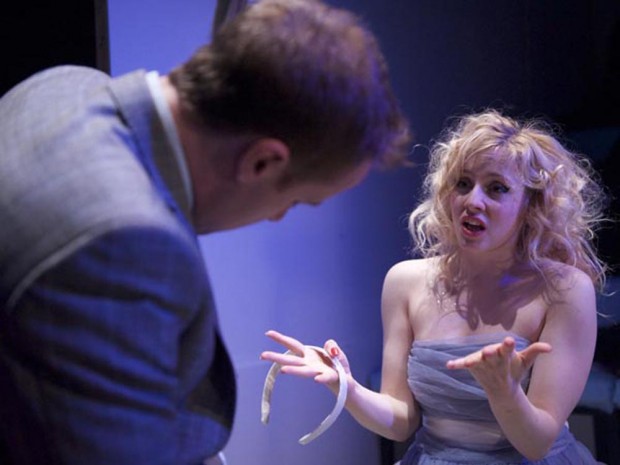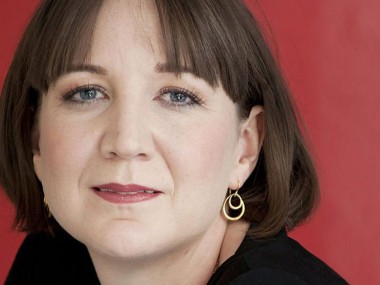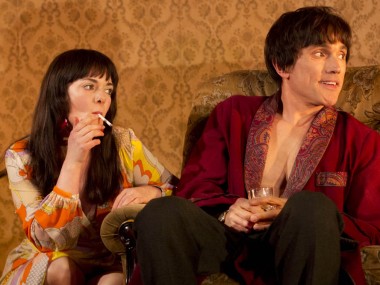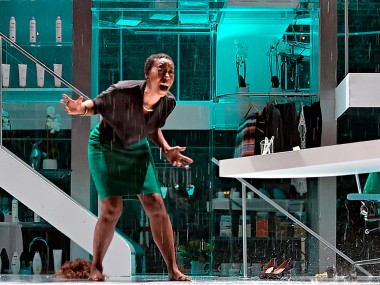Eigengrau, Bush Theatre
Monday 15th March 2010

One of the most common genres of contemporary Brit drama is the “me and my mates” play — usually stories about flatsharing twentysomethings. Although, over the past decade, this type of drama has been somewhat overtaken by the return of the family play, you can still spot the genre in new writing venues all over the country. So Penelope Skinner’s new 90-minute piece, which opened tonight at the Bush Theatre, is — despite its evocative name (which means the colour seen by the eye in perfect darkness) — at first sight as familiar as an old sofa.
Set in two flats at opposite ends of London, the play is character-led and feistily amusing: Cassie, a sensible twentysomething feminist, shares a flat with Rose, a New Age blonde airhead and fantasist who she met through Gumtree. Both are single. Meanwhile, two unattached men, the up-and-coming marketing manager Mark and his university chum, the needy, and nerdy, Tim, are also living in the same kind of set-up, except more upmarket.
But while the unemployed Tim mopes around the house, with the ashes of his recently deceased Nan kept in a cat-shaped container on the mantelpiece (the play is full of such delicious details), Mark is out and about, flashing his cash, and picking up girls. When he has a one-night stand with Rose, the two sets of flatsharers find themselves on a collision course. For while Rose believes that Mark is the One, he can’t wait to dump her.
Instead, Mark’s interest is kindled by Cassie, and her being a feminist just seems to turn him on all the more. At first, she laughs at his advances, and much of the spunky humour of this very funny play comes from Skinner’s ability to make the women’s point of view as strong as the men’s. At the same time as Mark is chasing Cassie, Tim meets Rose, and becomes instantly besotted with her. Pretty soon, the dance of love ends up — figuratively speaking — with all the characters in a heap on the floor.
Elegantly plotted, Skinner’s play is a strong mix of comedy and excruciating embarrassment. There’s a blow-job scene that must be one of the saddest sex acts ever depicted on stage, and a climactic act of self-mutilation that is almost unwatchable. Likewise, the karaoke moment, when a wounded character puts all of their little emotions into Bonnie Tyler’s “Total Eclipse of the Heart”, is desperately moving. At the same time, by the end, there’s also a sense of poetic justice in a play in which everyone gets their just desserts. Likewise, the metaphor of seeing in the dark is finally realised both literally and figuratively.
Designer Hannah Clark has turned the Bush into a space that evokes the London Underground, complete with the yellow line that passengers are always advised to stand behind, a set which suggests the lifeline that links the two flats in the play. On a traverse staging, with a chequered floor and only four red plastic chairs for props, director Polly Findlay occasionally struggles to use the constricted arena effectively, but her cast deliver excellent performances. Sinead Matthews invests Rose with a narcissistic self-confidence and emotional fury that contrasts well with Alison O’Donnell’s questioning, occasionally puzzled Cassie, while Geoffrey Streatfeild’s dynamic Mark is matched by John Cummins’s lazy but goodhearted Tim.
Although this amiable rom-com raises various issues about emotional infatuation and fixation, self-contradiction and self-harming, finding a role in life as well as a mate to share it with, the main memory is that of the satisfying release of hectic laughter, punctuated by in-yer-face shock and dread. This foursome has dark shadows, but most of it is bathed in light.
This review first appeared on The Arts Desk




